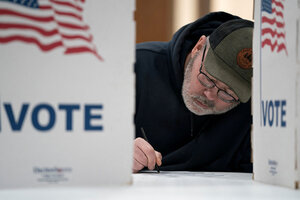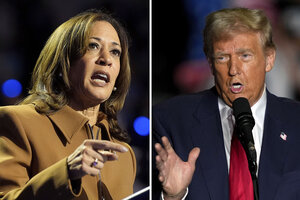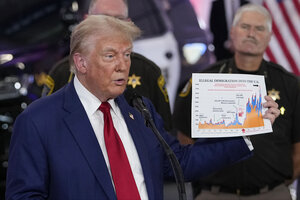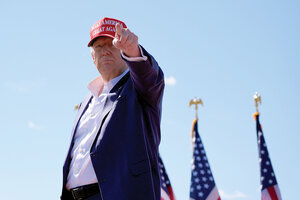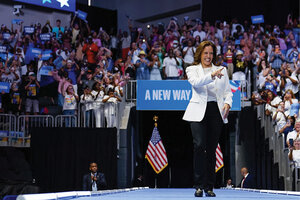This weekend shook American politics. Did it change Donald Trump?
Loading...
| Milwaukee
Former President Donald Trump, coming off an assassination attempt that shook America, will soon give what may be the most closely watched political speech of his life. How he leverages this moment will shape the trajectory of a turbulent era in U.S. politics.
Mr. Trump has become a near-messianic figure to some supporters, while detractors increasingly see him as a dangerous, despotic force.
Why We Wrote This
A party convention is typically a moment to rally the base with fiery, red-meat rhetoric. In the wake of an assassination attempt, many are urging presumptive Republican nominee Donald Trump to take a different tone.
That makes what Mr. Trump says this week, and for the rest of the campaign, so crucial. If a man famous for incendiary rhetoric leads the way in lowering the political temperature, it could go a long way toward avoiding future political violence. But if he can’t resist the urge to use the assassination attempt to paint Democrats as the real threats to democracy, that will further inflame tensions – and could spark more violence.
On Sunday night, President Joe Biden urged unity in a rare Oval Office address. Mr. Trump, for his part, told the Washington Examiner that he’d completely rewritten his convention speech. “This is a chance to bring the whole country, even the whole world, together,” he said.
On Monday, Mr. Trump named as his running mate Ohio Sen. J.D. Vance, who this weekend blamed Democrats’ rhetoric for leading directly to the Trump assassination attempt.
Former President Donald Trump, coming off an assassination attempt that shook America, will soon give what may be the most closely watched political speech of his life. How he leverages this moment will shape the trajectory of a turbulent era in U.S. politics.
Mr. Trump, a uniquely polarizing political figure in recent American history, has become a near-messianic figure to some supporters and a dangerous, despotic presence in the view of his detractors since his unlikely presidential victory in 2016. His narrow escape from a fatal shooting Saturday, which left him bloodied and a rally attendee dead, has only magnified some supporters’ belief that his candidacy is divine – and raised the stakes even further for this election.
That makes what Mr. Trump says this week, and for the rest of the campaign, so crucial. If a man famous for incendiary rhetoric leads the way in lowering the political temperature, it could go a long way toward avoiding future political violence. But if he can’t resist the urge to use this moment to paint Democrats as the real threats to democracy, that will likely further inflame tensions – and could spark more violence.
Why We Wrote This
A party convention is typically a moment to rally the base with fiery, red-meat rhetoric. In the wake of an assassination attempt, many are urging presumptive Republican nominee Donald Trump to take a different tone.
To paraphrase Mr. Trump himself from his 2016 Republican National Convention speech, he alone can fix it.
“Trump, in the wake of a near-death experience, may be seeing the world differently, at least for a little while. How that will manifest itself is unclear, but right now he’s more conciliatory,” says Carol “Rollie” Flynn, a 30-year CIA veteran and president emeritus of the Foreign Policy Research Institute who specializes in political violence.
Mr. Trump survived an attempt on his life and got another chance Saturday. This week will begin to show how he uses it.
Will he take the high road?
Taking the high road could pay political dividends. Mr. Trump’s divisive style is one of his biggest drawbacks politically, and his supporters’ violent breach of the Capitol on Jan. 6, 2021, after he spent months trying to overturn his election loss, still haunts his campaign.
The former president told the Washington Examiner that he’d completely rewritten his planned convention speech after the assassination attempt. “This is a chance to bring the whole country, even the whole world, together,” he said.
A senior Trump campaign adviser told the Monitor: “Given the experience of Saturday, he is looking to not only unify the party, but unify the nation, and make sure that Americans understand his vision for where the country can go.”
But there’s skepticism that he and his team will exercise the restraint and discipline that this would require – and signs that they’re already falling back into old habits. After a Trump-appointed judge on Monday dismissed the charges the former president faced in a Florida court for mishandling classified documents, Mr. Trump wrote: “The Democrat Justice Department coordinated ALL of these Political Attacks, which are an Election Interference conspiracy against Joe Biden’s Political Opponent, ME. Let us come together to END all Weaponization of our Justice System, and Make America Great Again!”
Also on Monday morning, Trump campaign spokesperson Danielle Alvarez blasted “Crooked Joe Biden,” saying it was “shameful” that he’d turned down an NBC-Telemundo debate offer focused on Hispanic issues, before saying the president was too cobarde (cowardly) to debate.
“Trump has had several opportunities to surprise and go in a different direction that at least to outside observers would seem to be politically in his interest, and in the past he hasn’t taken those opportunities,” says Peter Feaver, a Duke University professor who served on President George W. Bush’s National Security Council and has been critical of the former president.
“The track record shows he doesn’t stay a unifier for long,” he says, pointing to Mr. Trump’s reaction to a white supremacist’s murder of a counterprotester during violence in Charlottesville, Virginia; his martial response to the Black Lives Matter protests in Washington, D.C.; and his handling of the COVID-19 pandemic rhetorically. “Their narrative of ‘He’s the martyr; everyone is out to get him, and therefore, whatever he does in retaliation is acceptable’ – it’s very hard for them to go a whole week without that.”
How VP pick, allies also set tone
Another signal is Mr. Trump’s decision to name Ohio Sen. J.D. Vance as his running mate Monday, choosing a man with a penchant for sharp-elbowed rhetoric over two rhetorically sunnier options, North Dakota Gov. Doug Burgum and Florida Sen. Marco Rubio.
This weekend, Senator Vance blamed Democrats for the attempt on Mr. Trump’s life.
“Today is not just some isolated incident. The central premise of the Biden campaign is that President Donald Trump is an authoritarian fascist who must be stopped at all costs. That rhetoric led directly to President Trump’s attempted assassination,” he posted on X.
Mr. Vance, a Marine veteran and Yale Law School graduate whose book “Hillbilly Elegy” tells his story of growing up amid poverty and drug abuse in Appalachia, is also a former Trump critic. In 2016, he warned about where Mr. Trump’s incendiary rhetoric was leading America.
Trump campaign co-chairs Chris LaCivita and Susie Wiles sent an internal memo to staffers warning them not to use “dangerous rhetoric” after the assassination attempt. “We condemn all forms of violence, and will not tolerate dangerous rhetoric on social media,” they wrote, according to Reuters.
Mr. LaCivita himself had posted on X blaming Democrats for the assassination attempt Saturday evening, but quickly deleted it.
But plenty of Mr. Trump’s other close allies were quick to ramp up the rhetoric after Saturday’s tragedy.
Tennessee Republican Sen. Marsha Blackburn, who has a prime-time Monday evening speaking slot at the Republican National Convention, immediately cast blame on President Biden’s recent rhetoric. “Just days ago, Biden said ‘It’s time to put Trump in a bullseye,’” she posted on X Saturday evening, in a remark widely cited by Republicans.
(Mr. Biden’s fuller remarks indicate he was speaking rhetorically about refocusing criticism on Mr. Trump, but on Monday he said that it was a mistake to say he wanted to put a “bullseye” on the former president.)
Vivek Ramaswamy, a 2024 rival-turned-Trump acolyte who is also speaking at the convention, characterized the shooting as but the latest in a string of attempts to sideline the presumptive GOP nominee, including suing him and organizing legal challenges to having him on the ballot.
“No amount of verbiage today changes the toxic national climate that led to this tragedy,” he posted on X after the shooting.
Biden: “Democracy is on the ballot”
There’s no doubt that many Democrats feel that Mr. Trump is an existential threat to democracy, given his own rhetoric and actions as well as a core political message pushed by Mr. Biden and his allies that Mr. Trump’s reelection could be the end of democracy.
Mr. Trump spent the 2016 campaign leading chants of “Lock her up” about his political opponent, Hillary Clinton; tried to overturn his election loss in 2020 in efforts that led to the Capitol insurrection; and during the 2022 midterm elections tried (mostly unsuccessfully) to help election-denying allies win positions by which they could control future election results.
“Democracy is on the ballot. Your freedom is on the ballot,” Mr. Biden said in a major January campaign speech, warning that Mr. Trump is “willing to sacrifice democracy to put himself in power.”
Mr. Trump’s base feels the same about Mr. Biden – and has been stirred by similar rhetoric from the ex-president. “If we don’t win this election, I don’t think you’re going to have another election in this country,” he said in March.
But Mr. Trump has shown some previously uncharacteristic message discipline during this campaign, most recently following his debate with Mr. Biden in which he kept mostly quiet and instead let the story focus on Democrats’ dismay over Mr. Biden’s performance. The more he can maintain that, the better it might be for him politically – or at least for the country.
“I don’t know if it’s political advantage,” Reince Priebus, chairman of the 2024 Republican National Convention host committee and Mr. Trump’s first White House chief of staff, told the Monitor. “It could be American advantage.”













